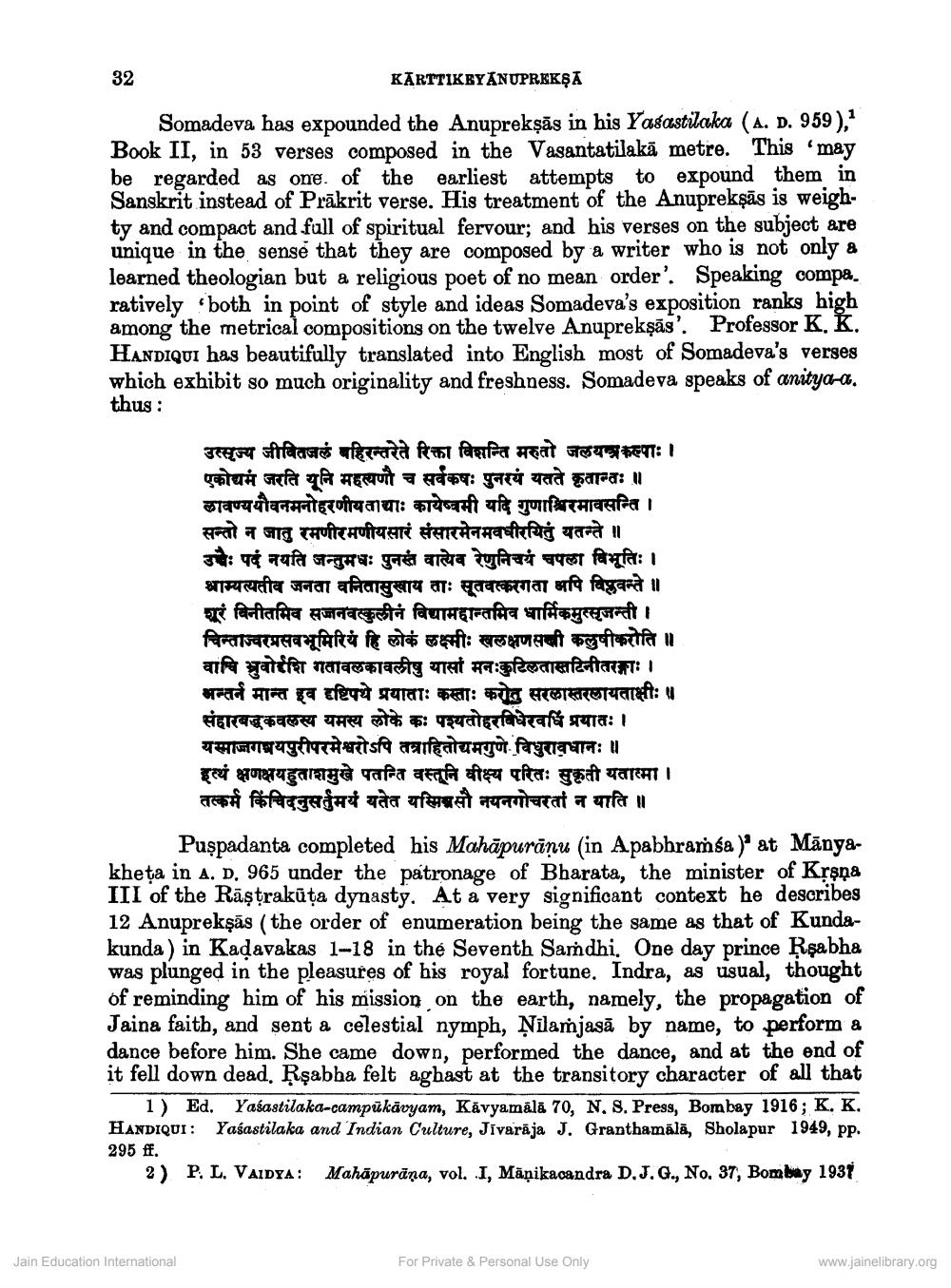________________
32
KĀRTTIKEYANUPRKKRA
Somadeva has expounded the Anupreksās in his Yasastilaka (A. D. 959)," Book II, in 53 verses composed in the Vasantatilakā metre. This may be regarded as one of the earliest attempts to expound them in Sanskrit instead of Prākrit verse. His treatment of the Anuprekşās is weighty and compact and full of spiritual fervour; and his verses on the subject are unique in the sense that they are composed by a writer who is not only & learned theologian but a religious poet of no mean order'. Speaking compa. ratively both in point of style and ideas Somadeva's exposition ranks high among the metrical compositions on the twelve Anuprekşās'. Professor K. K. HANDIQUI has beautifully translated into English most of Somadeva's verses which exhibit so much originality and freshness. Somadeva speaks of anitya-a. thus:
उत्सृज्य जीवितजलं बहिरन्तरेते रिक्ता विशन्ति मरुतो जलयन्त्रकल्पाः । एकोद्यम जरति यूनि महत्यणौ च सर्वकषः पुनरयं यतते कृतान्तः ॥ लावण्ययौवनमनोहरणीयतायाः कायेष्वमी यदि गुणाविरमावसन्ति । सन्तो न जातु रमणीरमणीयसारं संसारमेनमवधीरयितुं यतन्ते ॥ उचैः पदं नयति जन्तुमधः पुनस्त वात्येव रेणुनिचयं चपला विभूतिः । श्राम्यत्यतीव जनता वनितासुखाय ताः सूतवत्करगता अपि विप्लवन्ते ॥ शूरं विनीतमिव सजनवल्कुलीनं विद्यामहान्तमिव धार्मिकमुत्सृजन्ती । चिन्ताज्वरप्रसवभूमिरियं हि लोकं लक्ष्मीः खलक्षणसखी कलुषीकरोति ॥ वाधि ध्रुवोर्डशि गतावलकावलीषु यासां मनःकुटिलतास्तटिनीतरजाः । अन्तर्न मान्त इव दृष्टिपये प्रयाताः कस्ताः करोतु सरलास्तरलायताक्षीः । संहारबद्धकवलस्य यमस्य लोके कः पश्यतोहरविधेरवधि प्रयातः । यस्माजगत्रयपुरीपरमेश्वरोऽपि तत्राहितोयमगुणे विधुरावधानः ॥ इत्थं क्षणक्षयहुताशमुखे पतन्ति वस्तूनि वीक्ष्य परितः सुकृती यतारमा । तस्कर्म किंचिदनुसतुमयं यतेत यस्मिनसौ नयनगोचरतां न याति ॥
Puşpadanta completed his Mahāpurānu (in Apabbramsa) at Mānyakheta in A. D. 965 under the patronage of Bharata, the minister of Krsna III of the Rāştrakūta dynasty. At a very significant context he describes 12 Anuprekşās (the order of enumeration being the same as that of Kundakunda) in Kadavakas 1-18 in the Seventh Samdhi. One day prince Rsabha was plunged in the pleasures of his royal fortune. Indra, as usual, thought of reminding him of his mission on the earth, namely, the propagation of Jaina faith, and sent a celestial nymph, Nilamjasa. by name, to perform a dance before him. She came down, performed the dance, and at the end of it fell down dead. Rşabha felt aghast at the transitory character of all that
1) Ed. Yaśastilaka-campūkāvyam, Kāvyamala 70, N. S. Press, Bombay 1916; K. K. HANDIQUI: Yasastilaka and Indian Culture, Jivarāja J. Granthamälä, Sholapur 1949, PP. 295 ft.
2) P. L. VAIDYA: Mahāpurāņa, vol. I, Māņikacandra D.J. G., No. 37, Bombay 1931
Jain Education International
For Private & Personal Use Only
www.jainelibrary.org




